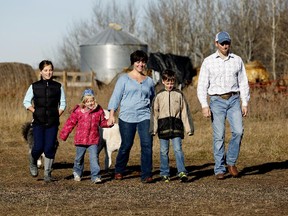Alberta farm family plans to eat only local for the next year
Farm family at Nature's Green Acres vow to eat purely local, and only directly from other producers, for the next year.

Reviews and recommendations are unbiased and products are independently selected. Postmedia may earn an affiliate commission from purchases made through links on this page.
Article content
It’s very Little House on the Prairie. Except the Little House has a computer.
That’s the slightly strange situation in which the Ruzicka family finds itself on Nature’s Green Acres farm, 320 acres near Viking in eastern Alberta. As of Aug. 15, this farm family committed itself to a year of living like pioneers, at least in terms of what they eat.
Mom Shannon and dad Danny, along with youngsters Madalynne (Maddy), 11; Josh, 9; and Molly, 6; will be consuming only food they grow, forage or raise themselves, or buy/barter directly from other local producers. There are two exceptions — salt (imported from Vancouver Island) and organic, sustainable sugar (imported from somewhere far away via the Vulcan-based organic tiller and miller, Grainworks).
“Those two were necessary for preserving, and for our sanity,” says Shannon with a laugh.
The experiment was inspired by reading a biography of Shannon’s great-grandfather, Julius Zacharias, who emigrated to Manitoba from Russia in 1912 to homestead. Reading of his family’s hardship, the Ruzickas wondered if they could withstand even a fraction of what their ancestors endured (naturally, they hope to avoid the Spanish flu).
“How in the world did they do it?” marvels Shannon. “We are so reliant on foods from all over the world. Could we rely on ourselves, our neighbours and friends, to survive a year?”
This experiment means no chocolate and no coffee. Only herbs from their garden, drying in bunches in the basement, can be used to add flavour to soups and stews. There will be no fruit this winter, except for summer berries now in freezers brimming with corn, green beans, tomatoes and shredded zucchini.
The family purchased a Jersey cow, Belle, specifically for this year’s effort, which adds an extra chore — cow care. During summer, Belle was producing 16 litres of milk and cream daily (too much to consume, so some went to the animals). But cooler weather means green grass is disappearing, Belle’s output is waning, too. Free-range chickens yield about a dozen eggs a day, plenty for breakfast, sandwiches and baking. Pork, beef and poultry are abundant, and the root cellar is stocked with carrots and beets.
The family may eat at other people’s homes if invited, but they are eschewing restaurants for a year. This is particularly difficult for Danny who, in addition to running their farm with Shannon, is a farrier. He’s always on the road, where he normally grabs a sub and a coffee before heading to his next job. Now he has to be conscious of packing his lunch, and a big one, too, as days spent shoeing horses are long and strenuous.
Shannon and the kids make regular trips to Edmonton to deliver Nature’s Green Acres specialty products such as Nouveau Beef and Landrice Pork (both of which go to butcher shops, as well as RGE RD restaurant). She forgot to pack a lunch during one such visit and all four felt famished, but wouldn’t allow themselves to buy something from a restaurant or grocery store. Luckily, a butcher offered in-house sausage for a snack, which only bent the rules slightly.
Farm life is hard, but 10 weeks into the experiment, it’s harder still. A great deal of time is devoted to research on producing what they need, including butter and cheese. Results have varied, but countless hours of practice have yielded a tangy, curd-like version of the latter, made only with milk (buying rennet is a no-no). It’s great served with potato wedges roasted in chicken fat and smothered with gravy — a Prairie Poutine that the kids just love.
“The biggest change for me is the lack of convenience. Everything requires so much effort,” says Shannon, who spends six hours a day preparing meals.
Cooking from scratch has taken on a new definition. Though always a conscientious home cook, Shannon didn’t often make her own bread, and when she did, she used yeast. But that’s not how the pioneers did it. Now Shannon makes sourdough bread from a starter, relying on wild yeast from the air as a leavening agent, with mixed results.
Josh wrinkles his nose when we talk about the sourdough. But it’s the only bread they have, so he eats it, with homemade crabapple jam or honey, collected from hives a beekeeper stashes on the Ruzicka land. (Forty gallons sounds like a lot of honey at the beginning of this experiment, but we’ll see what supplies are like in March.)
Shannon worries about April, starvation month in prairie lore because winter’s provisions are dwindling and nothing fresh is available. Shannon hopes for an early spring, when lambs quarters, a hardy weed, may poke through the melting snow.
Though Josh admits he misses eating out, the children — who are home-schooled — are surprisingly sanguine about the experiment. Maybe that’s because there is still kale in the garden (great for chips).
“We don’t get to buy our favourite things,” acknowledges Maddy. “But now, we are learning so much and most kids don’t get that chance.”
Favourites such as hot chocolate are swapped out for Creamy Mint and Honey, a warm, milky drink. The kids have also come to savour an old-fashioned, invented treat — a bowl of bread topped with warm, fresh cream and sugar.
The Ruzickas are a modern family in every way; the kids have numerous activities from figure skating to taekwondo. But it seems as if they have stepped back in time, into a world without packaged granola bars. There is a feeling of accomplishment about the experience, and they are also saving lots of money by not eating in restaurants or buying in stores, grocery or otherwise.
(The year’s challenge also involves not buying anything material that they don’t strictly need; the recent purchase of a washing machine was deemed acceptable because Shannon was loathe to bring out the washboard, and they did manage to find a used second-hand appliance online.)
“Our focus has changed in life,” says Shannon. “Even the financial. We are saving money, but that wasn’t the point. All the head space that was spent on stuff, on thinking about clothing or home decor, now it’s filled with … food.
“I feel more of a sense of contentment. There is no longer the intention of keeping up with anyone. I feel we’re focused more on our family, and our community.”
Check out edmjr.nl/eatmywords and follow me on twitter.com/eatmywordsblog











Postmedia is committed to maintaining a lively but civil forum for discussion. Please keep comments relevant and respectful. Comments may take up to an hour to appear on the site. You will receive an email if there is a reply to your comment, an update to a thread you follow or if a user you follow comments. Visit our Community Guidelines for more information.